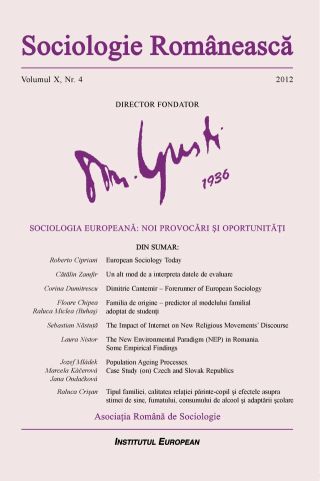Dimitrie Cantemir – Forerunner of European Sociology
Dimitrie Cantemir – Forerunner of European Sociology
Author(s): Corina DumitrescuSubject(s): Social Sciences
Published by: Editura Eikon
Keywords: homo sociologicus; social model; education; culture; religion; reason; sociology of action; knowledge; monograph
Summary/Abstract: The paper aims at making an analysis of the erudite Dimitrie Cantemir from the perspective of contemporary sociology. The ideas brought forth by this paper can be summarized as follows: The erudite prince, whom Nicolae Iorga characterised as “raised among books of wisdom”, managed to be a forerunner in the field of the future-to-be science of sociology. His fundamental work in this direction is Descriptio Moldaviae [Description of Moldavia], written upon request of the Berlin Academy of Sciences. Being written in Latin, as the philosopher-prince wrote this book of reference as foundation for the European sociology, allowed it to be studied by all European learners interested in aspects of a science that was to be defined. Moreover, arguments in support of the assertion that Dimitrie Cantemir is a forerunner of the science of sociology can also be found in other reference works, studies and monographs. A significant example is his work Hronicul vechimei a romano-moldo-vlahilor [Chronicle of the old history of the Romano-Moldo Vlachs] in which, as a true sociologist, Cantemir makes a comprehensive analysis of the way in which the Romanians had lived in Dacia, their organization, customs, social hierarchy and their cultural-social relations with other European peoples, considering them a “bridge between the Orient and the West”. Historia incrementorum atque decrementorum Aulae Othomanicae [The History of the Ascent and Descent of the Ottoman Court], although claimed by historians, is a reference work for the encyclopaedic mind of Dimitrie Cantemir, and a fundamental one for the European sociology. This book, existing in the Library of the American Congress, describes true sociologic investigations about the Turkish society and about the other European states of that time, which coexisted with the Ottoman Empire.
Journal: Sociologie Românească
- Issue Year: 10/2012
- Issue No: 04
- Page Range: 27-35
- Page Count: 9
- Language: English

